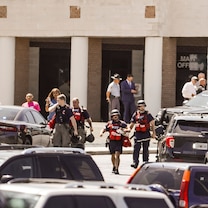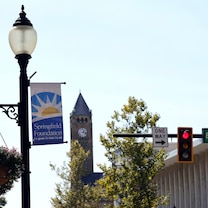87 and hobbled, Pope Francis goes off-script in Asia and reminds world he can still draw a crowd
Pope Francis' longest and farthest trip has proven that despite his age, ailments and eight hours of jet lag, Pope Francis can still pull off an ambitious trip to Asia
DILI, East Timor -- It was the farthest trip of his pontificate and one of the longest papal trips ever in terms of days on the road and distance traveled. But Pope Francis, age 87, hobbled by bad knees and bent over with sciatica, appeared to be having the time of his life.
With half of East Timor’s population gathered at a seaside park, Francis couldn’t help but oblige them with a final good night and languid loops in his popemobile, long after the sun had set and the field was lit by cellphone screens.
It was late, the heat and humidity had turned Tasitolu park into something of a sauna, and most of the journalists had already gone back to their air-conditioned hotel to watch the Mass on TV. But there was Francis, defying the doubters who had questioned if he could, would or should make such an arduous trip to Asia given everything that could go wrong.
“How many children you have!” Francis marveled to the crowd of 600,000, which amounted to the biggest-ever turnout for a papal event as a proportion of the population. “A people that teaches its children to smile is a people that has a future.”
The moment seemed to serve as proof that, despite his age, ailments and seven hours of jet lag, Pope Francis still could pope, still likes to pope and has it in him to pope like he used to at the start of his pontificate.
That’s never truer than when he’s in his element: in the peripheries of the world, among people forgotten by the big powers, where he can go off-script to respond to the spirit of the moment.
And it was certainly the case on his 11-day trip through Indonesia, Papua New Guinea, East Timor and Singapore, during which he clocked nearly 33,000 kilometers (20,505 miles) in air travel alone. It was a trip that he had originally planned to make in 2020 but COVID-19 intervened.
Four years and a handful of hospitalizations later (for intestinal and pulmonary problems), Francis finally pulled it off. He seemed to relish getting out of the Vatican and away from the weighty grind of the Holy See after being cooped up all year, much of it battling a long bout of bronchitis.
Francis does tend to rally during foreign trips, though he usually sticks to a script when he’s in the protocol meetings with heads of state, dutifully delivering speeches that were written in advance by Vatican diplomats.
But when he’s meeting with young people or local priests and nuns, he tends to show his true colors. He’ll ditch his prepared remarks and speak off-the-cuff, often engaging in back-and-forth banter with the faithful to make sure his message has stuck.
Doing so thrills the crowd, terrorizes his translators and complicates the work of journalists, but you always know Francis is enjoying himself and feels energized when he goes rogue. And he went rogue plenty of times in Asia — and on the in-flight press conference coming back to Rome, during which he urged American Catholics to vote for who they think is the “lesser evil” for president.
Francis started in Indonesia, arguably the most delicate destination on his itinerary given the country is home to the world’s largest Muslim population. The Vatican would be loathe to say or do anything that might cause offense.
And yet from his very first encounter with President Joko Widodo, Francis appeared in a feisty mood, praising Indonesia’s relatively high birthrate while lamenting that in the West, “some prefer a cat or a little dog.”
Francis has frequently made the same demographic quip at home in Italy, which has one of the world’s lowest birthrates. But the high-profile trip meant that his trademark sarcasm got amplified. American commentators immediately assumed Francis had entered the “childless cat ladies” debate roiling U.S. politics, but there was no indication he had JD Vance in mind.
Even in the most delicate moment in Jakarta, at Southeast Asia's biggest mosque, Francis threw protocol aside and kissed the hand of the grand imam and brought it to his cheek in gratitude.
In Papua New Guinea, Francis was similarly jazzed after pulling off a visit to a remote jungle outpost that had seemed impossible for him to reach: The airport in Vanimo, population 11,000, doesn’t have an ambulift wheelchair elevator that Francis now needs to get on and off planes, and bringing one in just for him was out of the question.
The stubborn pope, who really, really wanted to go to Vanimo, ended up rolling on and off the back ramp of a C-130 cargo plane that Australia had offered to get him, and the metric ton of medicine and other supplies he brought with him, to the town.
Despite the considerable security concerns of entering a region torn by tribal rivalries, Francis seemed to relish the jungle visit, perhaps because he felt so much at home. A dozen Argentine missionary priests and nuns have lived in Vanimo with the local community for years and had invited him to come. They decorated the simple stage in front of the church with a statue of Argentina’s beloved Virgin of Lujan, to whom Francis is particularly devoted, and had a gourd of mate, the Argentine tea, waiting for him.
In East Timor Francis had to negotiate perhaps the most sensitive issue clouding the visit: the case of Bishop Carlos Ximenes Belo, the revered national hero who won the Nobel Peace Prize for his nonviolent independence campaign. The Vatican revealed in 2022 that it had sanctioned Belo, who now lives in Portugal, for having sexually abused young boys and ordered him to cease contact with East Timor.
Francis didn’t mention Belo by name and didn’t meet with his victims, but he did reaffirm the need to protect children from “abuse." There was nary a mention of Belo’s name in any official speech during a visit in which East Timor’s traumatic history and independence fight were repeatedly evoked.
In Singapore, his final stop, Francis once again ditched his remarks when he arrived at the last event, a meeting of Singaporean youth on Friday morning.
“That’s the talk I prepared,” he said, pointing to his speech and then proceeding to launch into a spontaneous back-and-forth with the young people about the need to have courage and take risks.
“What’s worse: Make a mistake because I take a certain path, or not make a mistake and stay home?” he asked them.
He answered his own question, with a response that could explain his own risky decision to embark on the Asia trip in the first place.
“A young person who doesn’t take a risk, who is afraid of making a mistake, is an old person,” the 87-year-old pope said.
“I hope all of you go forward,” he said. “Don’t go back. Don’t go back. Take risks.”
___
Associated Press religion coverage receives support through the AP’s collaboration with The Conversation US, with funding from Lilly Endowment Inc. The AP is solely responsible for this content.




